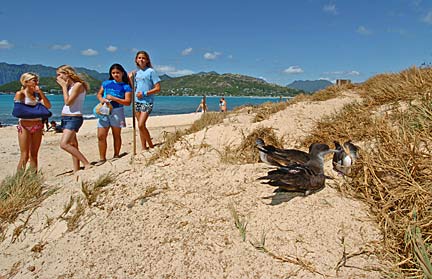
|
Surveys reflect
environmental concern
Isle residents hold beneficial attitudes
toward wildlife, a state official says
Hawaii residents want to take care of the state's wildlife and natural areas even if it inconveniences them or costs them money, the head of the state Division of Forestry and Wildlife told several hundred biologists attending the Hawaii Conservation Conference on Thursday.
Forty percent of Hawaii residents surveyed last year agreed with the statement that wildlife and animals "should coexist as if family," Paul Conry said at the Hawaii Convention Center.
The percentage of Hawaii residents giving that answer was higher than for any other Western state, he said.
About 25 percent of Hawaii residents believe that wildlife's main purpose is to benefit humans, according to a survey conducted by the Human Dimensions in Natural Resources Unit of Colorado State University.
An additional 22 percent said wildlife should both coexist with and benefit humans. And 12 percent described themselves as "distanced" from wildlife issues, Conry said.
Of Hawaii survey respondents:
» 93 percent said the state should increase funding to eradicate invasive species that are just starting to spread.
» 71 percent of residents said it is important to prevent the extinction of endangered species.
» 68 percent said whatever steps are necessary should be taken to remove game animals from areas where they threaten endangered species.
Respondents also said they'd be willing to wait longer at the airport if baggage inspections could deter alien species from entering the state. They'd even be willing to stay away from fragile natural areas that could be damaged by human use.
"Clearly the public is supportive of our efforts," Conry said to a group that includes workers for state and federal wildlife and conservation agencies.
"The overall results show how much people in Hawaii care about natural resources here," said Earl Campbell, invasive species biologist with the U.S. Fish & Wildlife Service.
Insect biologist Steve Montgomery said he found the survey results "very gratifying."
"It made me feel proud that Hawaii's people do have a strong environmental ethic," he said. Montgomery has discovered a number of new insect species in Hawaii.
The survey results are based on 1,150 written and phone surveys conducted with Hawaii residents in 2004.
E-mail to City Desk
[News] [Business] [Features] [Sports] [Editorial] [Do It Electric!]
[Classified Ads] [Search] [Subscribe] [Info] [Letter to Editor]
[Feedback]
